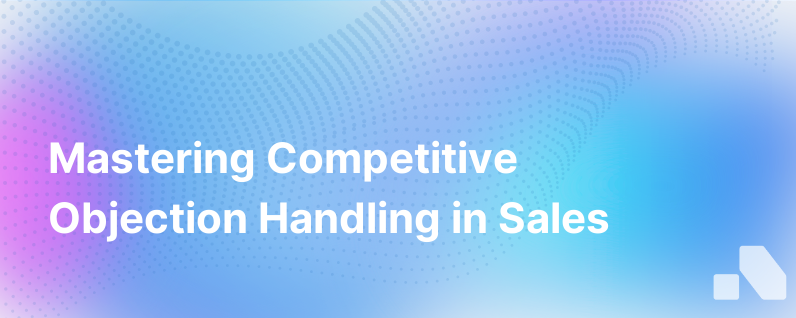
Mastering the art of handling competitive objections is the holy grail of sales. It's the secret sauce salespeople need to turn doubters into believers, competitors into allies, and leads into loyal customers. In the intricate game of B2B sales, objections are inevitable, and your ability to respond can make or break a deal.
In this comprehensive guide, we will unravel the art of responding to competitive objections with poise, strategic savvy, and confidence, enabling you to come out on top every time.
Understanding Competitive Objections
Before we delve into strategies to handle competitive objections, it's important to understand what they are. A competitive objection is any hesitation or concern raised by a potential customer that compares your offering to that of a competitor. It could be about price, product, service, or reputation. The secret to handling these objections isn't just knowing your product inside out - it's also about understanding your competitor's offerings as well as your client's perceptions of them.
The Stakes are High
For B2B salespeople, competitive objections can feel like a heavy blow. Often, you've put in significant time and effort to understand the client's needs, propose a solution, and work towards closing the deal. But handling objections is part and parcel of any sales job.
Deftly handling these objections can result in:
- Increased sales: Winning over a prospect with the power of persuasion and fact-based argumentation does wonders for your win rate.
- Enhanced reputation: Demonstrating respect, confidence, knowledge, and resilience during an objection can influence a prospect's view of you and your organization.
- Sustained relationships: Resolving a prospect's concerns and proving that you're in their corner builds the foundation for a long-term relationship.
Strategies for Overcoming Competitive Objections
Here are some tactics to help you turn objections into opportunities:
1. Anticipate objections
Before entering any sales conversation, anticipate potential objections. Understand who your competitors are, their offerings, strengths, weaknesses, and how they compare to you. Tools like Aomni, which delivers real-time account research and competitive insights, can drastically cut down on the preparation time and help you arrive well-equipped to every conversation.
2. Stay Composed
Remember, an objection isn't a personal affront. It's a chance for the prospect to validate their decision. Stay calm, composed, and don’t become defensive.
3. Sincerely Listen
Acknowledge the competitor and the prospect's concern. It's easy to jump into 'problem-solving' mode, but first, show you're genuinely interested in understanding them. Active listening will help uncover the underlying reasons for their objections.
4. Validate their Concern
Validation shows the prospect you value their perspective and feelings. It builds rapport and fosters trust. This could mean empathizing with their concerns or acknowledging the strength of a competitor in a particular area.
5. Redirect
Skillfully redirect the conversation from the competitor comparison to your unique offerings and how they address the prospect's needs. Never resort to badmouthing competitors. Keep the conversation focused on value, not competition.
6. Address the Objection Head-On
Respond factually and succinctly. Be straightforward about your product’s strengths and limitations. If you don't know something, be honest about it and promise to find the answer.
7. Confirm Resolution
After addressing the objection, confirm whether the prospect's concerns have been resolved. If not, dig deeper and continue the conversation.
The Role of AI in Tackling Competitive Objections
The modern, data-driven sales world presents a compelling case for leveraging AI in sales strategy, especially in dealing with competitive objections. Platforms like Aomni use AI to deliver personalized sales content which can give you an edge when handling objections.
Aomni’s unique AI presents real-time account research and competitive insights, enabling your sales team to be proactively prepared for any competitive objections. Through a deep understanding of your competitor’s offerings and market trends, Aomni sets you and your product apart, making a compelling case which is tough to object to.
Conclusion
Mastering the art of handling competitive objections is not an overnight task but with the right mindset, preparation, strategy, and technological advantage, you can turn competitive objections from deal-breakers to deal-makers. Embrace the challenge, engage with your prospect, and delicately steer the conversation. Remember, every objection is an opportunity in disguise to strengthen your pitch and build credibility with your prospect. Leverage tools like Aomni to remain a step ahead and turn competitors into allies and leads into loyal customers.